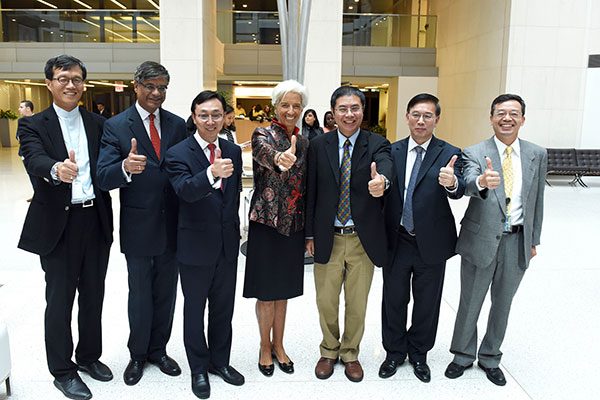
International Monetary Fund (IMF) Managing Director Christine Lagarde (C), IMF deputy managing director Zhang Tao (3rd L), IMF executive director for China Jin Zhongxia (3rd R) and IMF secretary Lin Jianhai (2nd R) pose for a group photo after Lagarde’s briefing on launch of the new Special Drawing Right (SDR) basket including the Chinese currency, the renminbi (RMB) in Washington D.C., the United States, Sept 30, 2016.[Photo/Xinhua]
The International Monetary Fund (IMF) on Sept 30 announced the launch of a new elite reserve currency basket including the Chinese currency, the renminbi (RMB), hailing it a “historic milestone” for China, the IMF and the international monetary system.
“As of tomorrow, the RMB will be considered by the international community as a freely usable international currency, and will join the basket of the Special Drawing Right (SDR) together with the US dollar, the euro, the yen and the British pound,” IMF Managing Director Christine Lagarde announced on Sept 30.
This was “the first time” in the history that the SDR basket was expanded, she noted.
“The inclusion of the RMB in the SDR basket will further diversify it, and will make its composition more representative of the global currencies and the global economy,” Lagarde said.
The IMF chief also said the RMB’s inclusion is “an important step” in the integration of Chinese economy into the global financial and monetary system and it reflects the progress made in reforming China’s monetary, foreign exchange, and financial systems.
Jin Zhongxia, IMF executive director for China, told Xinhua that this is “a new starting point” for China’s economic reforms and development, and that China will continue pushing for financial reforms following the RMB’s formal inclusion into the reserve currency basket.
“The continuation and deepening of these efforts, with appropriate safeguards, will bring about a more robust international monetary and financial system, which in turn will be good for the stability and growth of China and the international economy,” Lagarde said.
The RMB’s global reserve status also means that it will become the first emerging market currency that can be used to settle IMF credits and debts, experts said.
“There’s never before been a currency of emerging markets that is being used for international transactions in the IMF to borrow and lend. This is the first time that has ever happened,” Tamim Bayoumi, a senior fellow at the Peterson Institute for International Economics, told Xinhua.
“I think it’s a very important signal that the world is coming to terms with growing importance of emerging markets, not only in terms of trade, but also in terms of finance,” he said.
The executive board of the IMF on Sept 30 also decided the amounts of each currency in the new SDR basket, which will remain fixed over the next five years until the next review of the SDR basket.
“As exchange rates move amongst the major currencies the effective weights will fluctuate, but the currency amounts, the amount of the RMB, the amount of US dollars, euro, yen, and sterling are fixed,” Andrew Tweedie, director of the IMF’s Finance Department, told reporters in a conference call last week.
The SDR is an international reserve asset created by the IMF in 1969 to supplement its member countries’ official reserves. It can be exchanged among governments for freely usable currencies in times of need.
Last November, the IMF decided to include the RMB in the SDR basket as a fifth currency, effective Oct 1, 2016.
